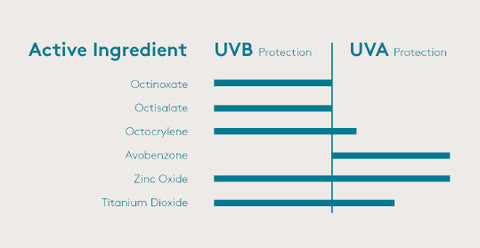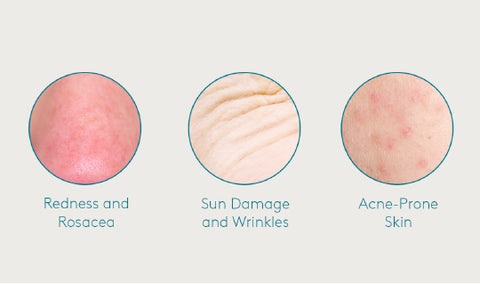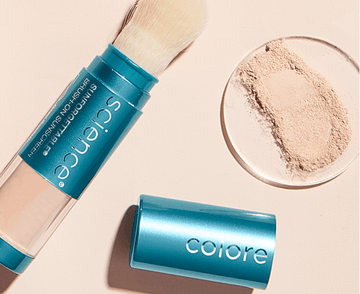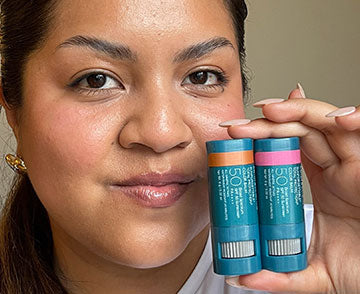
Mineral Sunscreen 101: Zinc Oxide & Titanium Dioxide
Have you ever been stumped by the list of ingredients in your SPF? You may have seen “zinc oxide” or “titanium dioxide” listed on everything from acne treatment, calamine lotion, makeup and sun protection - but what is the difference between zinc oxide and titanium oxide sunscreen?
Read on for everything you need to know about mineral screen UK and its hero ingredients:
UVB & UVA: Know the Difference
-
UVB rays have a short wavelength and affect the outermost layer of the skin. UVB radiation is responsible for tanning, burning and, in more extreme cases, peeling of the skin.
-
UVA rays have longer wavelengths and can penetrate into the deeper layers of the skin—the dermis and hypodermis. This type of UV radiation is responsible for 80% percent of the visible signs of ageing such as wrinkles, deep lines, and discoloration.
It is essential to look for broad-spectrum protection against both UVB and UVA rays in any SPF product you buy.
What is a physical sunscreen?
There are two different kinds of sunscreen: chemical and physical. Let’s take a closer look at the main differences between the two types of protection:
- Chemical sunscreen is made of synthetic ingredients like oxybenzone and octinoxate. They work by absorbing UV rays and converting them to heat which is realised before it can penetrate the dermis.
- Physical sunscreen is made of natural compounds that sit on top of the skin and block the sun’s radiation by deflecting UV rays like a mirror. Zinc Oxide sunscreen and Titanium Dioxide sunscreen falls into this category.

What are the benefits of using physical sunscreen?
Physical sunscreen UK protects your skin as soon as it’s applied, chemical formulas need approximately 15 minutes to sink into the skin and begin to work.
- Because of their “heat releasing” mechanism of protection, chemical protection wear off quicker when the skin is exposed to direct UV light and needs to be reapplied more often.
- Chemical sunscreens are formulated with ingredients that can cause irritation to sensitive and allergy-prone skin types, while physical SPFs are pretty gentle on the skin and much less likely to cause irritation or allergic reactions.
Zinc Oxide vs Titanium Dioxide
Zinc oxide and titanium dioxide are the only FDA-approved UV filters for sun protection. They come in a variety of forms—from powders for invisible reapplication to liquids for full body and face coverage.
Zinc Oxide SPF Benefits:
-
Non-comedogenic: Zinc oxide sunscreen is great for people with congested and acne-prone skin as it is completely oil-free and doesn’t clog pores.
-
Antimicrobial: Zinc oxide sunscreen is proven to have antimicrobial properties that can help soothe irritation and heal wounds more quickly.
-
Invisible protection: Unlike most chemical formulations, zinc based sunscreen doesn’t leave a white cast or a greasy residue on the skin.
Titanium Dioxide Sunscreen Benefits:
-
Gentle on the skin: Titanium dioxide sunscreen is extremely gentle, making it a great choice for those affected by inflammatory conditions such as rosacea and eczema.
-
Non-comedogenic: Just like zinc oxide, titanium dioxide is completely non-comedogenic.
-
Invisible: Titanium Dioxide sunscreen doesn’t leave an opaque layer on the skin which makes it a perfect match for all skin tones.
Sunscreen Options for Common Skin Problems

Rosacea
Chemical sunscreens often contain synthetic fragrances, dyes and oils that can potentially trigger flare-ups and exacerbate rosacea symptoms such as redness, itching and burning. Zinc oxide sunscreen is a great for skin discoloration and rosacea-prone skin as it is not only a reliable shield against UVB/UVA rays but also provides soothing and antimicrobial benefits.
More advanced mineral sunscreen formulas such as our Sunforgettable Total Protection Face Shield work to hydrate and offer protection against pollution and enviromental aggressors. Featuring Vital E3, vitamin B3 and chamomile extract, the rich, hydrating formula fights facial redness and provides UV protection of SPF 50.
Acne
Thick, chemical sunscreen often feels heavy and uncomfortable on acne and blemish-prone complexions. Sunscreens that contain oils can exacerbate excess sebum production and clog pores. On the contrary, titanium dioxide sits on top of the skin, offering broad-spectrum SPF protection with no skin congestion.
Our Sunforgettable Brush-On Shield SPF 50 goes even further than just UVB/UVA protection. Our patented EnviroScreen technology protects your skin from free radical damage, while it lightweight powder formulations mattifies excess shine and helps keep your makeup in place throughout the day.
Mineral Sunscreen 101
Mineral sunscreens like zinc oxide and titanium dioxide are versatile, gentle, and effective options for protecting your skin. Whether you have sensitive skin, rosacea, or acne, these hero ingredients offer reliable broad-spectrum protection while addressing common skin concerns.
Invest in smarter, skin-friendly sun protection and let your SPF work harder for you—because healthy, protected skin is always in style.


